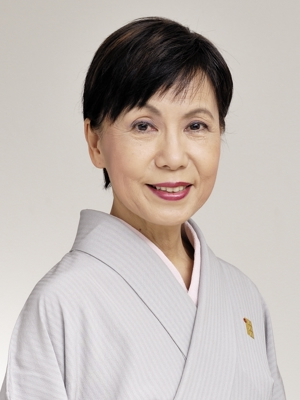As part of the "Private University Branding Project", the Research Center for Edo-Tokyo Studies has been created at Hosei University. The inauguration of this Center holds great significance for Hosei University.
Firstly, it enables us to progress with overall university branding and this branding project as one whole. Branding which began in earnest in 2014 under the long-term vision HOSEl2030 has gradually led to the enactment of a University Charter, alongside formulation of new missions and visions, and declarations about diversity etc. With branding workshops held by staff members, we continue to shape Hosei University's image for the next generation. The launch of the Branding Project within this process will undoubtedly benefit the whole University.

President at the time of establishment, Hosei University;
Tanaka Yuko
Secondly, this Branding Project has its roots in the history of research at Hosei University, and for that reason its chances of success are high. Research of Edo culture at Hosei University has a long history, led by Kondo Tadayoshi from pre-war into the post-war period, and Hirosue Tamotsu and Matsuda Osamu thereafter. In the 1980s, scholar of Italian architectural history and urban history, Jinnai Hidenobu was active in Edo-Tokyo studies, as Tanaka Yuko's study of Edo began. Jinnai Hidenobu, through research on water cities, created the Laboratory of Regional Design with Ecology, while Tanaka Yuko, at the Research Center for International Japanese Studies, furthered research of Edo culture and literature, along with Yokoyama Yasuko and Kobayashi Fumiko. This Branding Project, then, has come about from a collaboration between the Laboratory of Regional Design with Ecology and the Research Center for International Japanese Studies to launch "Edo-Tokyo Studies".
Thirdly, the project will be formed from a combination of engineering and humanities fields. At Hosei University, there has been a tradition of scholars' research at the Faculty of Engineering and Design, as well as in science and technology, the life sciences and information science. Of course, there are also many eminent scholars who have been active in the humanities and social sciences, who have conducted research relating to Edo-Tokyo. At the Tama Campus, many years' worth of important research has amassed from the "Tama's History, Culture and Natural Environment Study Group".
A research base could mean a place for exchange with scholars from outside the university, or it could mean creating a new framework for research through a shared space for scholars active within the university. Furthermore, this is an opportunity for us to join with people from the wider society and the commercial sector in contributing to business and city planning, and designing a new society.
In this way, the Research Center for Edo-Tokyo Studies will aim to become a base for forming links, exchange and creativity. We have put forward four projects, although each will not advance its research separately; the idea is to raise a theme for which all projects can apply their methods. Such a relationship will necessarily give ground to opening the doors to participation from outside the university.
We sincerely hope for the success of the Research Center for Edo-Tokyo Studies in its role in shaping the future of Hosei University, Edo-Tokyo studies, and Tokyo itself.